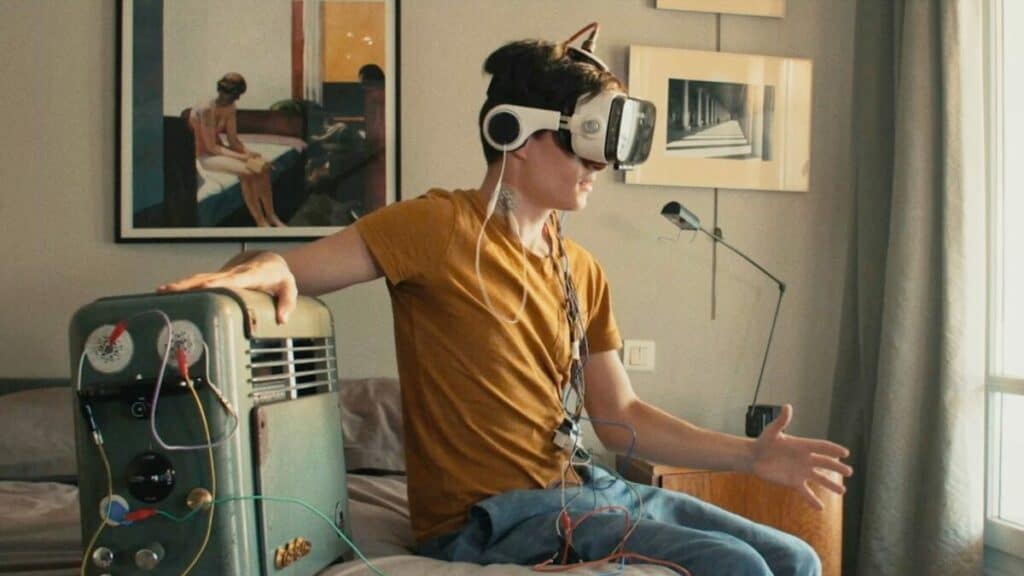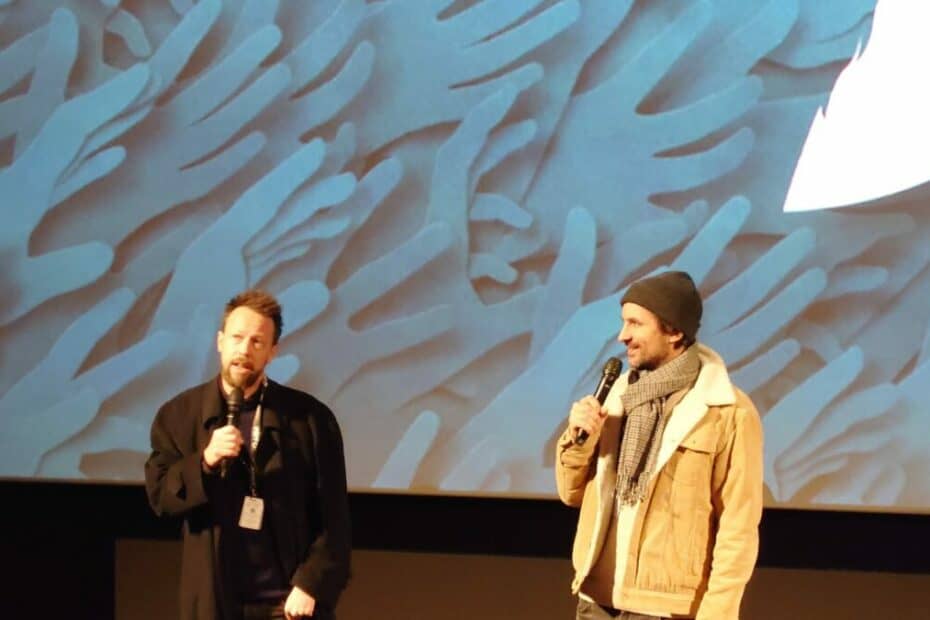I saw THE END (artificial fragments of humankind), reviewed here at the Black Nights Film Festival in Tallinn. The film is as puzzling as it is exhilarating, but I reckoned that conducting an interview with the Héraud Brothers would make everything linear and crystal clear, or maybe not… In any case, I was sure that it would be an interesting talk about cinema. With that in mind, I sat down with Aurélien and Olivier Héraud.
So where to begin with THE END? Maybe at the start where we see a text stating that the film was written by an artificial intelligence. I thought it was a joke, but then I saw Chat GPT mentioned in the end credits, so what’s the deal here?
Aurélien Héraud: We really used artificial intelligence only for the screenplay, and it was a beta version of what is now Chat GPT-4. Yes, the fact is that we wanted to talk about the lack of communication between humans, that they always try to avoid confronting their fears and weaknesses. So they “need” to go to a therapist or a guru or see a friend who is not a real friend. They can also have pets and talk to them if they are really alone. We also felt that artificial intelligence will be present in the future, at least to make people feel less lonely.
So, we tried this kind of beta version, which was quite particular and even a bit stupid sometimes. We looked at it and thought that this was what we wanted since this absurdism sometimes borders on surrealism. AI can’t distinguish between what is true or false, and we wanted that feeling, like a dream or nightmare that might actually be real. It is as if we have a camera and we go into another world, but we made a documentary of this world. For us, there is a reference to surrealism and cadavre exquis
Like you have the sensation that you are just watching it and not creating it?
Olivier Héraud: Yes, it’s like a more modern way of cadavre exquis. It was interesting to have two human brains and a machine. We used the Chat GPT for many parts of the creation. To use a metaphor, we regard it as a mille-feuille.
Like a layer cake?
AH: Yes, with different layers, also like an onion. Maybe some people will not like the film for that reason, but that is what we wanted to do. In a nightmare, you are always the main protagonist. We didn’t want to do that, but we wanted a nightmarish ambience, but not through one person’s eyes. You asked if it was a joke, but it’s not. Well, the part where the voice says that she made all of it on her own is a joke since Chat GPT didn’t do everything.

AI in Wonderland by the Héraud brothers
You mentioned human error, but Chat GPT is rife with errors as well; it just takes stuff from everywhere, so there is a risk that you can just get a bunch of old films or old books as it takes or “steals” stuff from everywhere. On the other hand, that’s what artists do, too.
OH: Yes, we decided to assume that, put these things together, and stress these quotes and references rather than hiding them. Some were quite obvious, like the David Lynch things.
There are lots of things in the film that could be tied to Lynch for those who want to simplify things.
OH: We play with that. When people see the guy with the white face, they think of Lost Highway and say that Lynch “already did that.”
And as soon as they see the rabbit, they will think about Lynch as well.
OH: A fun fact is that we shot the scene with the talking rabbit before he made that short.
So, the project has been ongoing for some time, then?
AH: Yes, we started around five years ago.
For me, the film is very meta, a film about cinema and how we see the world.
Both brothers, in unison: Yes, yes.
And I was wondering about that first sequence. Esther is telling a story to a friend in a bar, and she gets irritated that she is not listening. When the friend asks what “the Mexican” did, Esther says, “I never said that he was Mexican.” But when we see the same story playing out while Esther tells the story, the guy looks Mexican to us. So it’s like, not only is the friend not listening, but it seems that instead, she is watching the same film as the spectator. Is that the point of that scene?
OH: Yes, exactly. We were talking earlier about layers, but in a way, we wanted the film to reflect real life through its modern take on surrealism. Life happens in many layers simultaneously. When I’m talking to you, I might, in fact, be thinking about something else that happened a long time ago or wonder what you will think of what I’m saying. Different levels co-exist in life all the time.

One of my favourite directors, Alain Resnais, often talked about that. He said that his films didn’t have flashbacks but just displayed how our minds work. The British director, Mark Jenkin, said the same when I interviewed him. He called cinema the greatest thing ever invented because it can replicate, with the marriage of sound and image and temporal and geographical dislocation, the way our minds work.
AH: That is true. Our minds work like that all the time. The problem with making a film like this is how it should be described to an audience before watching it. People want to know what the storyline is or who and what it “is about.” We are intentionally playing with that, as well. In some scenes, we present a character who might become the main protagonist.
I’ve been thinking that THE END will be a nightmare to review, but it must also be difficult to distribute, even to festivals.
AH: That is true. That is exactly the problem; we talked to distributors who said they love the film but do not know what to do with it. Not necessarily for financial gain but just to get the film out there.
Maybe word of mouth is the solution. People will have to see the film for themselves. This is a film that should be experienced, not talked about, but if people tell each other about their experience with the film, it might work out.
OH: Yes, or bouche à oreille as it is called in French. That is the best way. It is also quite important for us that the film is seen in a cinema, even though we are aware that many people watch films on their laptops.
Even critics, unfortunately. On the other hand, there are sometimes disturbances during cinema screenings as well, like people being on their phones.
AH: We know that, and we actually played with that in the scene with Lazardis visiting his therapist and telling him something very sensitive. Suddenly, a phone rings, and we made it sound like it was a phone in the cinema. It was very difficult to achieve, but we wanted to play with the fact that it happens during screenings.
Haha, I was sure that it was someone in the audience. It is so typical…
Oh, sorry, I should answer this.
[At this moment, my phone rang, and I was instructed by someone called Mr Rabbit that the interview had reached THE END.]
